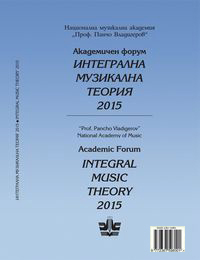О роли музыкально-теоретических дисциплин в профессиональной подготовке юных музыкантов
On the Role of Music Theory in the Professional Education of Young Musicians
Author(s): Nadejda ZenkinaSubject(s): Social Sciences, Education, Fine Arts / Performing Arts, Music, School education, Educational Psychology
Published by: Издателство НМА „Проф. Панчо Владигеров”
Keywords: music education; solfeggio; creating; theory; practice; Orff Orchestra;
Summary/Abstract: Contemporary culture presents many challenges to the traditional role of music education. Subjects such as solfeggio, music theory, and harmony are under intense scrutiny. The purpose of this article is to underscore the importance of solfeggio for professional musical development. Solfeggio instruction must reject mundane scholasticism, and more actively cultivate musical development: memory, harmonic and rhythmic sense, and improvisation. Interdisciplinary approaches to solfeggio and related subjects (e.g., the Orff Orchestra) in place at the Gnessin Special Music School are especially important at this time. General problems encountered in solfeggio instruction are in the balancing of two poles: theory and practice vs. knowledge and ability. Possible responses to the challenges of solfeggio instruction are: attention to the comprehension of all aural components. It is important to emphasize aural comprehension by listening and to actively engage them in practice, not just to know the terminology. This applies equally to classical and contemporary music. One of the most important elements of a musical education is the coordination of all the components of solfeggio through special classes. It is essential to know and understand the function of the fundamental chords as early as possible; intelligent hearing breeds intelligent performance, i.e., real musicality. This also concerns non-professional, general musical education (depending on the type of school). In contrast to earlier times, musical amateurs do not have active contact with music, and as a rule cannot play any instrument. This increase in the number of passive amateurs and decrease of active ones can lead to a reduction of classical music listeners. Lessons learned from the Orff Orchestra (also useful in professional musical education) can actively stimulate musicality in children, who may never become professional musicians. Solfeggio then (though not necessarily ‘music’ or ‘singing’) is also necessary for a general musical education.
Journal: Академичен форум »Интегрална музикална теория«
- Issue Year: 2016
- Issue No: 1
- Page Range: 73-79
- Page Count: 7
- Language: Russian

